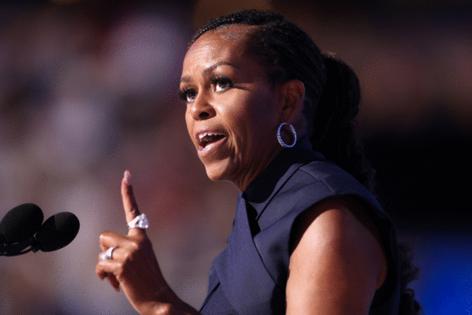Commentary: 'Black jobs' slur and anti-DEI mindset are bad for business
Published in Op Eds
It’s a trend with no clear expiration date and every sign of continuing — the “Black job” meme, which began in June when former President Donald Trump said immigrants were taking “Black jobs” and “Hispanic jobs.”
In the weeks that followed, one of the more joyful iterations came when Shonda Rhimes, among the most successful television producers and screenwriters in history, posted a photo of herself on Threads wearing a T-shirt that read, “My Black Job is TV Titan.” And at the Democratic National Convention, Michelle Obama made the point that the presidency was a “Black job.”
But what accounts for the staying power of this meme, one that Gen Z icons like Simone Biles have happily embraced? Why is it that nearly three months since its original utterance the public imagination continues to delight in mocking the notion of jobs categorized by race and ethnicity?
Because the thinking behind it is comically outdated. But it’s also a central core of today’s opposition to diversity, equity and inclusion practices. In coining the terms “Black jobs” and “Hispanic jobs,” the former president perfectly distilled the anachronistic mindset behind the anti-DEI backlash, just as others have tarred people of color in leadership as a “DEI hire,” a “DEI mayor” and the possible “DEI president.”
These are today’s slurs — the belief that people of color have a fixed place at the bottom and that when they’re successful, they haven’t earned it. It’s the same mindset that perversely sees diversity, equity and inclusion measures as giving advantages to people from underrepresented groups rather than what DEI is: a method for including people who have been systematically kept on the margins.
But it’s time to be honest — the anti-DEI mindset is highly perishable from a business perspective. It just won’t keep. The most cursory glance at the horizon makes this clear.
For those who oppose diversity, equity, and inclusion measures, it should be troubling to know that Gen Z is not with you. To today’s 13- to -27-year-olds, an anti-DEI mindset is as appealing as coal-fired power plants. Today’s youth are more than their TikTok makeup tutorials and inscrutable slang: Members of Gen Z are employees, customers, innovators, voters and leaders — to an extent today, and growing steadily.
And they’re the most diverse generation so far. In the United States, only 52% are non-Hispanic white (compared to 61% of millennials), one in four are Hispanic, and 22 percent identify as LGBTQ, nearly three times the rate of the population as a whole.
By 2031, Gen Z is expected to make up about 31% of the U.S. workforce and currently makes up 27% of the global workforce.
Of all the generations, Gen Z has expressed the lowest levels of“ spiritual health,” the feeling that their lives have meaning and they find purpose in their work. The employers that can meaningfully respond to that sentiment will be the ones that attract and retain young employees. DEI is a big part of that. Eighty percent of job seekers aged 18-34 say a company’s investment in diversity, equity and inclusion is very or somewhat important to them when they are considering a new job, according to Glassdoor. Also consider that 65% of Gen Z in the United States and United Kingdom acknowledge having mental health challenges, according to Oliver Wyman.
There’s a connection between these three data points. Together they shine a light on a key component of DEI: A climate of belonging is one in which each person’s unique identity is valued; assimilation is not the goal.
The benefits of responding to Gen Z’s priorities are obvious: Inclusion minded Gen Z employees will know how to sell to, communicate with, and design, innovate and problem-solve for those in their cohort and with some naturally overlapping Gen Alpha soon. And the benefits of their contributions extend to the rest of us. By 2025, Gen Z online shoppers are expected to outnumber Gen X online shoppers. Meanwhile, the estimated global spending power of Gen Z exceeds $450 billion. And 50% of Gen Z shoppers want companies to take a position on social issues, particularly racial justice, LGBTQ+ rights, gender inequality and climate change.
Now, look, there are plenty of anxiety-themed conversations to be had: Artificial intelligence, rising authoritarianism, climate change and the next inevitable pandemic all promise to affect how we live and work. But telling the next generation of employees, leaders and consumers they shouldn’t be who they are need not be on the list.
____
Devlin is managing director of Open to All. Unguresan is founder of the EDGE Certified Foundation.
____
©2024 The Fulcrum. Visit at thefulcrum.us. Distributed by Tribune Content Agency, LLC.




























































Comments